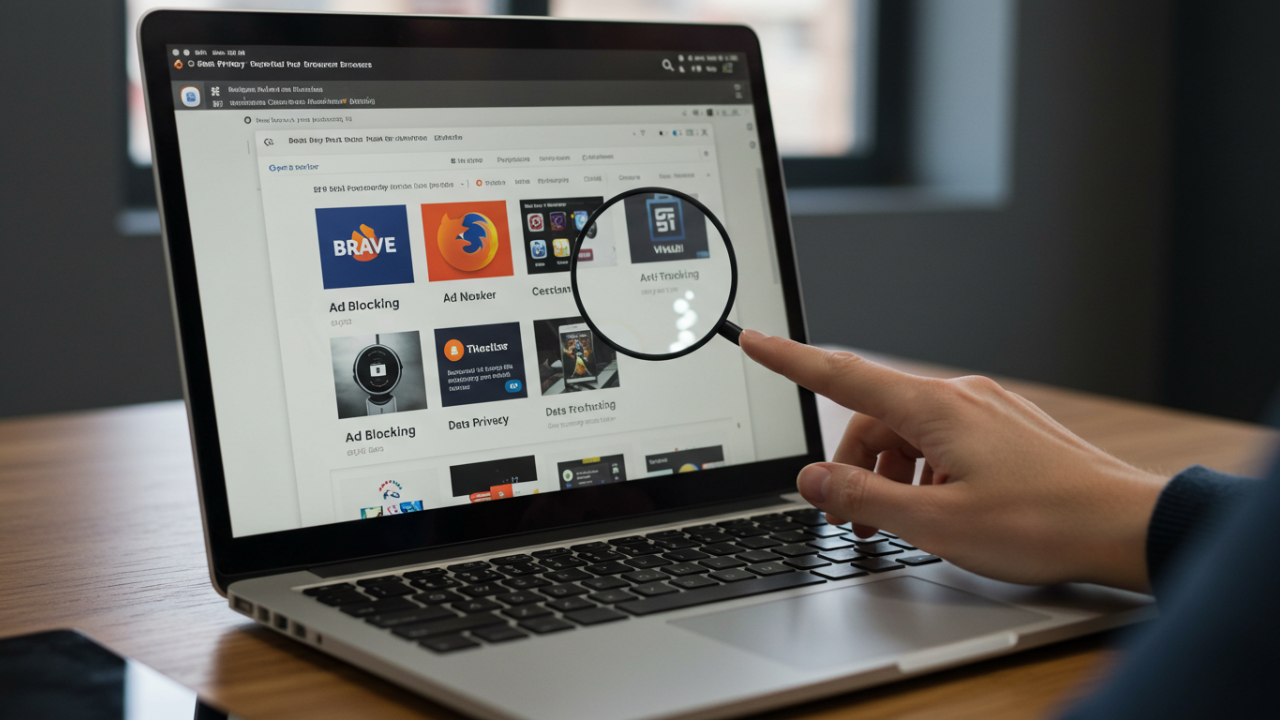Advertisement
Intro of Best privacy-focused browsers (Chrome alternatives)
As surveillance expands to the digital realm, online privacy is emerging as one of the critical concerns for internet users. With more of our sensitive data being monitored and stored, selecting a browser with robust privacy features has become indispensable. Chrome, while widely popular, notoriously collects extensive user data and therefore, compromises privacy.
In this article I will shift my focus to some of the best alternatives to Chrome that guarantee strong privacy and user protection. It doesn’t matter whether you are already familiar with the idea of privacy or an expert, this guide aims to help you choose the most suitable option for personal secure browsing.
Why Privacy Matters in Browsing
What is Online Privacy?
It is the individual’s right and ability to control the collection and use of their personal information and activities online. This can involve browsing history, search keywords, location, or even the particular materials or media products u interact with.
Without appropriate measures in place, personal information data can be acquired and exploited by advertisers, or malicious stakeholders tracked, or even exposed in a data breach.
Most websites collect intricate details regarding your activities using cookies, tracking pixels, and several techniques. Sadly, most modern day browsers do not make it simple for users to block this type of tracking.
Why Google Chrome Isn’t Ideal for Privacy
Your browsing experience is unified with a Google account; however, it comes at a price which is privacy. Data collection and relevant advertisements are a gold mine of business for Google, and as a result, a large portion of your browsing history is utilized to generate profiles consisting of your preferences.
The following are some reasons that can explain Chrome’s privacy issues:
-
Data Collection: From your browsing activities, searches, and even your current location, Google has access to all of this data.
-
Tracking: The different services offered by Google make cross site tracking possible, therefore enabling users to track your activity over several websites.
-
Lack of Privacy Controls: A lack of more advanced privacy features in Google Chrome is detrimental to it, and they don’t try to modify the default privacy features in Chrome which are rather cunning.
Consequences of Compromised Privacy
Your sensitive information can be misused in a multitude of ways if adequate privacy measures are not taken:
-
Targeted Ads: Due to the advertiser’s algorithm, your browsing history can be analyzed, leading to the presentation of hyper-relevant ads, which in turn, clusters privacy exploitation.
-
Identity Theft: Accumulated and marketed sensitive data can be used for deceitful actions.
-
Cyberattacks: There is an upsurge in the chances of a cybernetic assault on the user when they are targeted by nefarious groups after revealing certain personal details, attributing to their nature as cyber aggressors.
Key Features to Look for in Privacy-Focused Browsers
While choosing a privacy browser, one must consider the listed features and functionality of the software:
Enhanced Tracking Protection
The ability to stop third-party trackers is one of the most prominent features of a privacy browser. These trackers follow your activities online and store information about your online lifestyle and interests. Privacy-centric browsers possess tracking protection which prohibits trackers from siphoning your information from different websites.
Better Data Encryption
Browsers with strong encryption guarantee that all data sent and received over the internet is sent and received securely. Sensitive data like logins, credit cards, and personal messages need to be encrypted because such information is sensitive and harmful in the hands of identity thieves and intruders.
No Data Collection
Some browsers do not record any personal information of their users. Such no-log browsers do not save any data on your browsing history especially making it easy for your online movements to be tracked and profiled.
Privacy by Default
Most privacy browsers focus on user privacy from the inception. These browsers have privacy settings set and enhanced policies activated by default to ensure that users do not spend time customizing them to avoid data breaches.
Open-Source Software
Open-source browsers are developed openly. They can be scrutinized by anyone because their source code is made public. This ensures that there are no backdoors for tracking and helps users trust the privacy features offered by the browser.
Best Privacy-Focused Browsers (Chrome Alternatives)
Lets take a look at some of the best alternatives to Chrome that are built with privacy aspects in mind. Privacy is key with these browsers and are implemented with features that seek to protect your information while browsing online.
1. Mozilla Firefox
For as long as it has been available to users, Firefox has been one of the most used browsers. One of the main features users look out for is the level of privacy with the browser. Mozilla provides users the option to customize their settings making it one of the best alternatives to Chrome focused on privacy.
-
Key Features:
-
Enhanced Tracking Protection (ETP): Firefox blocks advertising as well as social media trackers which are third party trackers.
-
Container Tabs: This function allows the users block cross-site tracking by isolating certain sites.
-
Privacy Customization: These settings allows users fine tune directives like blocking cookies, controlling permissions to site as well as prevent fingerprinting.
-
-
Pros:
- Community driven and open sourced.
- Automatically enables strong tracking protection.
- Offers extensive customization.
-
Cons:
-
Slow loading speedsm when compared to other browsers, which can be an inconvenience for users.
-
2. Brave Browser
Brave is a browser developed with a user’s privacy in mind, enabling speed sensitive browsing without the worry of ad trackers, privacy invasions or other parasitic meddling. Privacy is prioritized without sacrificing performance.
-
Key Features:
-
Ad and Tracker Blocking: All ads and trackers are banned automatically by Brave.
-
Tor Support: Anonymity can be further enhanced by utilizing the Twisted Onion Router network for easier use.
-
BAT Rewards: Users are able to earn Basic Attention Tokens (BAT) for viewing Brave’s non intrusive ads.
-
-
Pros:
- Increased performance during browsing due to built-in ad notifiers.
- Emphasis on user privacy and anonymity.
- Reward earning that’s free of privacy infringement.
-
Cons:
- Given its comparitive novelty, there may be bugs that affect its usability with certain webpages.
3. Tor Browser
Tor Browser is the most privacy-centric browser on the web. By passing your internet traffic through a series of servers (or nodes tend to call them), Tor ensures your online activities remain unprecedented, as no one can track your actions. Tor is perfect for users who wish to be undetectable at all times.
-
Key Features:
-
Onion Routing: Your traffic undergoes encryption and routing through several servers ran by volunteers which obfuscates your browsing—commonly known as Onion Routing.
-
No Tracking: One of the most secure browsing tools available, it does not track your browsing activity.
-
-
Pros:
- Best lines of defense to remain undetectable.
- Open to the public with no associated costs.
- Provides an adequate level of privacy with little data collection.
-
Cons:
-
Routing traffic through various layers can diminish browsing speed.
-
Not all sites work with the Tor network.
-
4. DuckDuckGo Privacy Browser
While DuckDuckGo is mainly known for its search engine, it also has a browser that prioritizes user privacy. The DuckDuckGo browser doesn’t collect or save any personal information with the aim of reducing online tracking.
-
Key Features:
-
Privacy by Default: The DuckDuckGo browser blocks tracking and data collection by default.
-
Search Engine Integration: The DuckDuckGo inbuilt search engine doesn’t track users’ search queries.
-
-
Pros:
- No prior configuring required.
- No collection or tracking of data.
- Best suited for users who seek a straightforward privacy experience.
-
Cons:
- Less adaptable than other browsers in terms of customization.
5. Safari (for Apple Users)
For Apple users, the integrated privacy features in Safari make it a good web browser choice. Even though its privacy features are not as good as Firefox or Brave, Safari does offer reasonable tracking and data encryption.
-
Key Features:
-
Intelligent Tracking Prevention: Prevents third party cookies from tracking user activity online.
-
Encryption: Encrypts data exchanged between the user’s device and websites during browsing sessions.
-
-
Pros:
Effortlessly becomes part of the Apple ecosystem.
Simple to operate due to included privacy features.
Macbook and iMac users along with iPhone and iPad users can use the product effectively.
-
Cons:
- Users of Apple products exclusively.
- Compared to other browsers that offer more privacy, lacks personal options.
6. LibreWolf
LibreWolf is a privacy-focused fork of Mozilla Firefox, developed with an emphasis on security and privacy. It’s an open-source browser that removes telemetry and other privacy-compromising elements present in the standard Firefox version.
-
Key Features:
-
No Telemetry: LibreWolf doesn’t collect any data or telemetry.
-
Privacy Enhancements: It includes enhanced security features, such as disabling WebRTC and using stronger encryption protocols.
-
-
Pros:
-
Fully open-source with no telemetry.
-
Strong privacy and security features.
-
Easy to use for Firefox users.
-
-
Cons:
-
Requires manual installation and setup.
-
How to Maximize Your Privacy with These Browsers
To fully maximize the use of your privacy-oriented browser, there are several measures you can use to protect sensitive data.
Using Incognito or Private Mode
Most browsers include Incognito Mode in Chrome and Private Browsing Mode in Firefox. Aside from not saving browsing history and cookies, these modes also store website data temporarily. Your privacy is not completely protected while browsing privately, as your activity can still be tracked through your IP address.
Customizing Browser Settings for Privacy
Enhancing privacy in a browser can be done by customizing their default settings:
- Block third-party cookies.
- Switch on HTTPS-Only mode.
- Manage permissions to disable access to camera, microphone and geolocation services.
Using Extensions to Enhance Privacy
The following extensions can be integrated into your browser to enhance your privacy:
-
uBlock Origin: Eliminates ads and trackers.
-
Privacy Badger: Blocks trackers that follow users across different sites.
-
HTTPS Everywhere: Ensures secure connections to sites that enable HTTPS.
You can also read Best free Notion templates for students (2025)
My Opinion
The Most Private Browsers Comparison As for the other options, using a privacy-oriented browser is one of the steps to ensure security while operating online. Whether you’d like them or not, there’s a multitude of browsers from which one can select that helps with online privacy. Migrating from Google Chrome to any other browser helps to curtail the amount of personal data being harvested about you. Pick a browser that you will be comfortable with and have better browsing experience.










Leave a Reply
View Comments